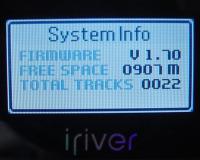Tag: gadget
-
Flashing the iRiver T10
 Today I received the iRiver T10 I’d ordered a week ago. Initially, I had been put off by the fact that the players sold inside EU were Microsoft-only. But then I found out it’s possible to flash the firmware to get rid of the MTP crap.
Today I received the iRiver T10 I’d ordered a week ago. Initially, I had been put off by the fact that the players sold inside EU were Microsoft-only. But then I found out it’s possible to flash the firmware to get rid of the MTP crap.After having tried the WMP10 approach with my new toy once, this is what I set out to do.
The Pure and Non-Pure versions were explained at MisticRiver forums. The “Non-Pure” version has an FM radio. Mine doesn’t, so it’s “Pure”. The firmware version my player came equipped with was 1.23P.
So I picked up the Pure version from mtp-ums.net and proceeded by the instructions provided there. I missed the verifying question about firmware upgrade after the restart, but you can start it from the advanced menu.
The first flashing took a little under a minute. After the restart there was the ominous “Scan music file…” screen, as promised, and the player was now a UMS device when I plugged the USB cable in. Halfway there!
I then uploaded the Australian firmware, from iRiver, into the player. During flashing this file, the screen was a backlit black, once again as promised. The flashing took closer to two minutes this time. After this, I had a fully working, UMS-abled T10 with the latest firmware version 1.70.
-
iRiver T series MTP to UMS conversion firmware
“iriver […] decided to only release Microsoft’s proprietary Media Transport Protocol (MTP) versions of their new T series MP3 players to Europe and the US, thus locking users into using Windows Media Player 10 and Windows XP to transfer music to their players.
iriver had a good reputation for listening to their customers and now maintains UMS firmwares for their older iFP line of MP3 players as well as firmwares for their own original proprietary transfer protocol. Luckily for us, they did release UMS versions to the rest of the world and so the firmwares were out there ready to be tried. Under normal circumstances an MTP player will not accept a UMS firmware, but we managed it! The conversion process is as simple as upgrading a player normally.”
mtp-ums.net via charles
some links added -
Watch your data inflate the Flashbag
“From the wish-I’d-thought-of-that department: the Flashbag. Designed by Dima Komissarov, it’s a standard USB flash drive that has a tiny pump in it that inflates when you load it with data.”
-
iPod thefts fueling juvenile crime
“Last year, 15-year-old Christopher Rose was killed by teen muggers in an iPod robbery in Brooklyn.
A spike in teen-on-teen thefts of pricey iPods contributed to a 26% jump in juvenile robbery arrests last year, cops said.”
-
aXbo sleep phase alarm clock
“[We] have invented the alarm clock of the future waking you up optimally at your best sleep phase – like waking up by your inner clock. […]
aXbo registers your individual optimal wake up time via your body movements and wakes you up in between the last 30 minutes before your wake up time. Your movements are detected and gathered with a comfortable towelling wristband and submitted to the sleep phase alarm clock.”
-
The Bob-clock
“The Bob-clock is a wall-clock I have built, which uses 60 multi-color LEDs arranged in a circle to represent the small and big arm of an analog clock. If desired, it can also display the seconds with a third color.”
symlink.dk via Juha
-
DRM drains the batteries of portable players
“Heavy DRM [sucks the very life out of an MP3 player]. Take, for instance, the critically acclaimed Creative Zen Vision:M, with a rated battery life of up to 14 hours for audio and 4 hours for video. CNET tested it at nearly 16 hours, with MP3s–impressive indeed. Upon playing back only WMA subscription tracks, the Vision:M scored at just more than 12 hours. That’s a loss of almost 4 hours, and you haven’t even turned the backlight on yet.
We found similar discrepancies with other PlaysForSure players. The Archos Gmini 402 Camcorder maxed out at 11 hours, but with DRM tracks, it played for less than 9 hours. The iRiver U10, with an astounding life of about 32 hours, came in at about 27 hours playing subscription tracks. Even the iPod, playing back only FairPlay AAC tracks, underperformed MP3s by about 8 percent.”
